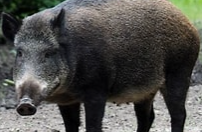From the Office of Public Affairs | http://www.news.ku.edu
Headlines
Contact: Rick Hellman, KU News Service, 785-864-8852, [email protected], @RickHellman
New book offers fresh take on Jewish political thought
LAWRENCE — Before and apart from modern Israel, the stateless, “wandering” Jew was and is a cliché. So how can there be a particularly Jewish form of political thought?
Proof of that can be found in a new book “The King Is in the Field: Essays in Modern Jewish Political Thought” (University of Pennsylvania Press), co-edited by Samuel Hayim Brody, University of Kansas associate professor of religious studies.
Named for the annual period of introspection before the High Holidays, when the heavenly king is said to be in the field among the laborers, the dozen authors take on such topics as German-Jewish political thought between the world wars, the effect of interwar American-Jewish philanthropy on the attitudes of non-Jewish Poles and the 16th century Messianism of the Israeli mystic Rabbi Hayyim Vital.
Of course, the world’s only Jewish nation is unavoidable in such a book, and so “The King is in the Field” has chapters that deal with Zionism, which is the belief that such a state is necessary for Jewish survival.
“Zionism is one form of Jewish thought that is a very significant one because it involves and applies to the operation of an actually existing state in a way that most Jewish political thought has not because of the thousands of years of exile,” Brody said. “But in this book, it’s not presented as the natural culmination of all Jewish political thought over time. It’s presented as an important and interesting site of the expression of Jewish political thought.
“So, for example, we have an essay on the way that one important justice saw the relationship between Israeli Supreme Court decisions and Jewish religious law. That’s an interesting topic. It doesn’t necessarily connect to the kinds of things that Americans like to argue about with respect to Israel, but it is an important aspect of Jewish political thought, and it’s deeper than the sort of arguments that people have about what’s mainstream, what’s legitimate criticism of Israel, what’s antisemitic.”
In his chapter, Shaul Magid compares and contrasts various forms of Zionism with the ideas of such back-to-Africa Black activists as Marcus Garvey and Kwame Ture (the former Stokely Carmichael), as well as U.S. white nationalists like Richard Spencer.
Lihi Ben Shitrit criticizes the Women of the Wall, a group of Jewish feminists seeking equal access to pray at the Western Wall, for failing to extend the same ethos of equality to their Palestinian Arab sisters.
And perhaps most controversially, Vincent Lloyd, Africana Studies professor at Villanova University, gives serious theological consideration to antisemitism and African American writer Alice Walker.
Brody said he and co-editor Julie Cooper, Tel Aviv University associate professor of political science, solicited essays from their cohorts in a 2016 symposium on the topic of Jewish political thought, sponsored by the Herbert D. Katz Center for Advanced Jewish Studies at the University of Pennsylvania.
Having just completed work on his 2018 book “Martin Buber’s Theopolitics” (Indiana University Press), Brody took on co-editorship of the project.
He echoed what he and Cooper wrote in their introduction.
“The book is a marker of what’s going on in the field at this point,” Brody said. “There used to be this anxiety to show that there was something called the Jewish political tradition, which is a single thing that runs like a thread through thousands of years of Jewish politics. It goes back to the Bible and continues in the medieval world, gets picked up in the modern world and culminates in the state of Israel or in America — whichever angle you’re coming from.
“And what we noticed here is that the field has now evolved to the point where, first of all, the scholars themselves are not necessarily working out their own identity issues. It includes non-Jewish scholars who choose to be interested in this topic. And second of all, the field has evolved to the point where people are no longer so anxious to demonstrate that everything fits into some sort of grand picture. It’s more relaxed and explorative. And so you can have things like we have in this book— for example, a study of the dreams of Hayyim Vital, the 16th century kabbalist, which I don’t think anybody would have previously thought to include in a study of Jewish politics.”
Brody said he is pleased that the book also contains chapters by two of the “senior figures in the field,” Michael Walzer (“Communal Organization in the Diaspora”) and Menachem Lorberbaum (“A Theological Critique of the Political”).
He said he is also pleased with the way the book is organized into three sections modeled on the thematic parts of the Rosh Hashanah (Jewish New Year) afternoon worship service. The Hebrew words and their translations are Malchuyot (regimes), Zichronot (remembrances) and Shofarot (Blasts of the Shofar). For editors Brody and Cooper, this reflects a “provincialism,” or Jewish specificity, that lends authenticity to the enterprise.
“All the political science categories we talk about — democracy and tyranny, for example — these go back to Aristotle,” Brody said. “What are the categories that are in Jewish sources? They’re not those. You don’t have any word for those things. … So what are the Hebrew terms for political things?”
-30-
————————————————————————
KU News Service
1450 Jayhawk Blvd.
Lawrence KS 66045
Phone: 785-864-3256
Fax: 785-864-3339
[email protected]
http://www.news.ku.edu
Erinn Barcomb-Peterson, director of news and media relations, [email protected]
Today’s News is a free service from the Office of Public Affairs




